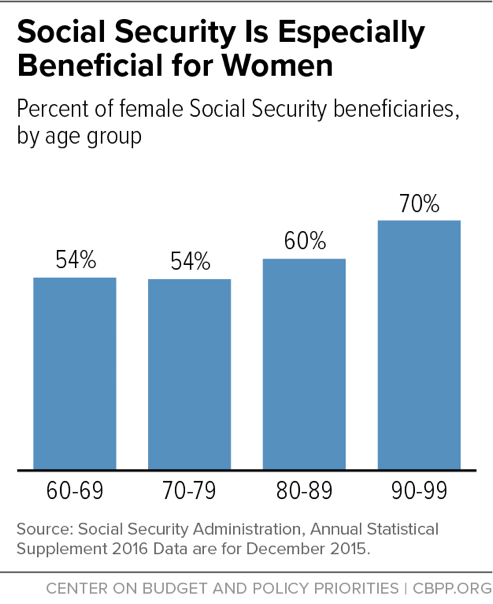BEYOND THE NUMBERS
Today is Social Security’s 82nd birthday. We’ve updated our backgrounder on Social Security’s significant impact and a related analysis of its benefits. In June 2017, over 60 million people collected modest benefits through Social Security.
Americans strongly support Social Security because it allows them to earn critical financial support for themselves and their families not just for retirement, but also in the event of disability or death.
Women especially benefit from the program because they tend to earn less than men, take more time out of the paid workforce, live longer, save less, and receive smaller pensions. Women make up a majority of elderly Social Security beneficiaries, particularly among older age groups, as the chart below shows. Women comprise more than half of Social Security beneficiaries in their 60s and 7 in 10 beneficiaries in their 90s.
Because they tend to live longer, women also benefit disproportionately from the program’s inflation-protected benefits. For example, women turning 65 in 2015 are estimated to live, on average, for a little over two more years than men and therefore to receive retirement benefits for longer.
Women's reliance on Social Security increases over time, especially as they outlive spouses and savings. In 2014, 65 percent of women aged over 80 received at least half of their family income from Social Security compared to 45 percent for women aged 65 to 69. Women also benefit from Social Security’s progressive benefit formula because they tend to have lower earnings.
Furthermore, women benefit significantly from Survivor’s Insurance. In June 2017, women made up 97 percent of Social Security survivor beneficiaries. That’s both because they are likely to outlive their husbands, and because their husbands are likely to out-earn them. (The surviving spouse receives the higher of her own earned benefit or her spouse's. Since benefits are based on lifetime earnings, men typically have higher benefits.)
Overall, Social Security has a powerful anti-poverty effect on women. In 2015, Social Security lifted an estimated 12.6 million women out of poverty, including 9 million women aged 65 and over. Without Social Security, 44 percent of elderly women would live in poverty, compared to 10 percent with it.

